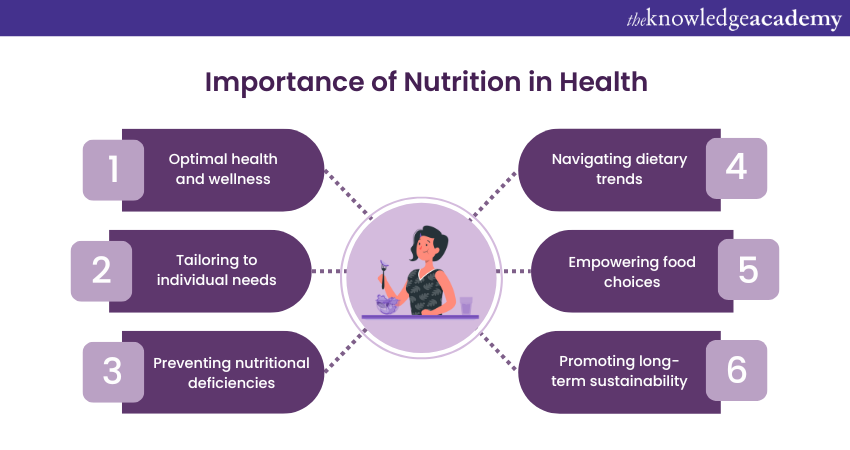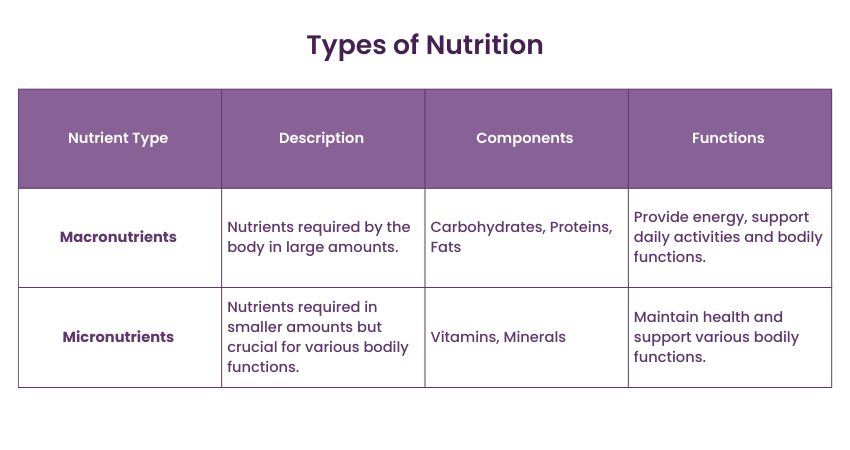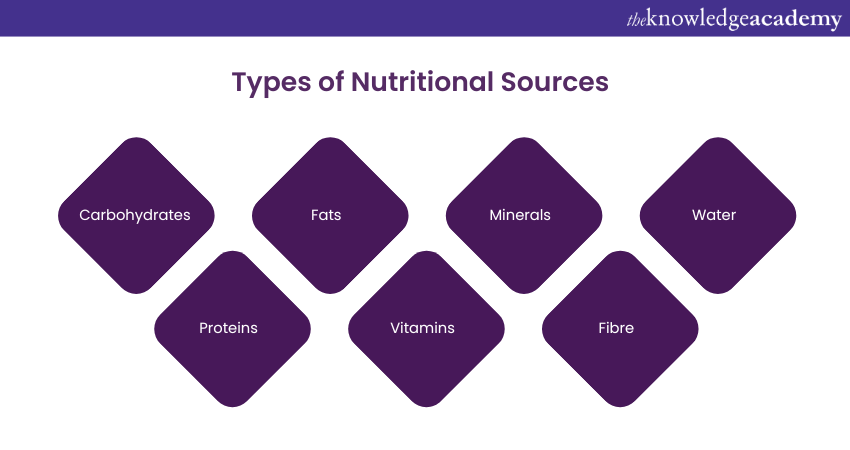We may not have the course you’re looking for. If you enquire or give us a call on +61 1-800-150644 and speak to our training experts, we may still be able to help with your training requirements.
Training Outcomes Within Your Budget!
We ensure quality, budget-alignment, and timely delivery by our expert instructors.

Welcome to the fascinating world of food and well-being! Nutrition isn’t just about what we eat; it’s about nourishing our bodies and spirits with the right kind of sustenance. In this blog, we’ll delve into the various Types of Nutrition that are essential for our overall health.
From the energy-boosting carbohydrates to the muscle-building proteins, and the essential vitamins and minerals that keep our systems humming, we’ll explore how different Types of Nutrition play a unique role in keeping us at our best. So, grab a snack, get comfy, and let’s unravel the vibrant tapestry of nutrients that contribute to the art of healthy living!
Table of Contents
1) Definition of Nutrition
2) Importance of Nutrition in Health
3) Types of Nutrition
4) Modes of Nutrition
5) Types of Nutritional Sources
6) Conclusion
Definition of Nutrition
Nutrition encompasses the intricate process through which organisms acquire and utilise essential nutrients from food, sustaining life and promoting health. A balanced diet includes macronutrients like carbohydrates (providing energy), proteins (for tissue repair), and fats (supporting various bodily functions). Micronutrients, such as vitamins and minerals, play vital roles in metabolic processes and overall well-being.
Organisms exhibit different modes of Nutrition: autotrophs produce their own food via processes like photosynthesis, while heterotrophs (including humans) consume other organisms or organic matter. Proper hydration is also integral to overall Nutrition. Understanding and adhering to sound Nutritional practices are essential for disease prevention and lifelong well-being.
Nutrients play specific roles:
a) Cell Maintenance and Repair: Proteins maintain healthy cells and tissues, while vitamins and minerals aid tissue regeneration and wound healing.
b) Enzyme and Hormone Production: Enzymes facilitate chemical reactions, and hormones regulate bodily functions. Proper Nutrition supports their synthesis.
c) Nutrient Absorption: Carbohydrates, fats, vitamins, and minerals are absorbed in the digestive system, contributing to energy, cell structure, and overall health.
Importance of Nutrition in Health
Understanding the various Types of Nutrition is crucial for making smart dietary decisions, leading to improved health, well-being, and longevity. Let's explore their importance:

Optimal Health and Wellness
Good Nutrition is essential for overall health. By understanding macronutrients, micronutrients, and hydration, individuals can create balanced diets that support their body’s functions, energy levels, and vitality. Proper Nutrition reduces the risk of diseases, strengthens the immune system, and promotes well-being.
Tailoring to Individual Needs
Everyone has unique Nutritional requirements based on factors like age, gender, activity level, and health status. Knowledge about different Types of Nutrition enables individuals to customise their diets. For example, athletes may need higher carbohydrate intake, while those with medical conditions might require specialised diets.
Preventing Nutritional Deficiencies
Understanding vitamins and minerals helps prevent deficiencies. Consuming a diverse range of nutrient-rich foods ensures overall health and well-being.
Navigating Dietary Trends
The world of Nutrition is influenced by trends and fads. Understanding the fundamentals equips individuals to evaluate these trends based on scientific evidence rather than marketing hype.
Empowering Food Choices
Specialised Nutrition, such as sports Nutrition or plant-based diets, empowers individuals to make healthy choices aligned with their values and goals. This knowledge contributes to physical, mental, and emotional well-being.
Promoting Long-term Sustainability
Balanced Nutrition is key to sustainable health. Avoid crash diets and extreme eating plans, and focus on realistic, enjoyable, and maintainable approaches for lasting benefits.
Revitalize your routine! Join the Healthy Lifestyles Training movement and embrace a brighter, healthier future!
Types of Nutrition
Nutrition can be classified into different types based on the Types Of Nutrients required and the modes through which organisms obtain their food. Here are some of the different Types of Nutrition:

Macronutrients
Macronutrients are nutrients required by the body in large amounts. They include carbohydrates, proteins, and fats. Carbohydrates serve as the primary energy source, crucial for brain function, while proteins are necessary for building and repairing tissues. Fats offer concentrated energy and are essential for the absorption of fat-soluble vitamins.
Micronutrients
Micronutrients are nutrients required in smaller amounts but are crucial for various bodily functions. They include vitamins and minerals that play a vital role in maintaining health. Vitamins are organic compounds vital for normal growth and metabolism. Minerals are inorganic elements necessary for bodily functions. Both vitamins and minerals are crucial for maintaining overall health and well-being.
Modes of Nutrition
Modes of Nutrition describe how organisms obtain their food. There are two primary modes: autotrophic and heterotrophic Nutrition.
Autotrophic Nutrition
Autotrophic Nutrition is a mode where organisms produce their own food from inorganic substances. This is primarily seen in plants, algae, and some bacteria through photosynthesis. They use sunlight, carbon dioxide and water to create glucose, which serves as their energy source.
Heterotrophic Nutrition
Heterotrophic Nutrition is a mode where organisms depend on other organisms for food. This includes animals, fungi, and most bacteria. They obtain energy by consuming plants or other animals, breaking down complex organic substances into simpler forms that can be absorbed and utilised by the body.
Learn the principles of balanced diets with our Nutrition Course – join today!
Types of Nutritional Sources
Understanding the various sources of Nutrition helps in making Healthy Lifestyle Choices. Here are the key Types of Nutritional sources:

Carbohydrates
Carbohydrates are the body’s primary energy source.
They come in two types:
A) Simple Carbs: Found in naturally sweet foods (fruits, vegetables, milk) and added sugars.
a) Easily converted to glucose for energy.
b) Excess sugar can be stored as fat.
B) Complex or Starchy Carbs: Found in whole grains, legumes, and vegetables.
a) Longer digestion time provides sustained energy.
b) Opt for whole grains over refined ones to avoid rapid energy spikes.
Proteins
Protein is a fundamental component of our bodies, found in every living cell.
a) There are 20 amino acids, with nine being essential (not produced by the body) and must be obtained from food.
b) Animal products (meat, dairy) provide complete proteins with all essential amino acids, while plant proteins may lack some. Combining different plant proteins ensures a complete amino acid profile.
Fats
A) Essential for health, fats come in various types:
a) Unsaturated Fats: Found in plant foods (nuts, seeds, olive oil).
i) Help lower blood pressure and support overall health.
b) Saturated Fats: Present in meat and dairy products.
i) Limit intake to less than 10% of daily calories.
c) Trans Fats: Found in processed and deep-fried foods.
i) Best avoided.
B) Recommended daily fat intake ranges from 44 to 77 grams for a 2000-calorie diet.
Vitamins
a) Vitamins are vital for various bodily functions, including immune support, brain health, and energy conversion.
b) Trace amounts of vitamins are necessary to prevent deficiencies and maintain overall health.
c) Opt for fresh, unprocessed foods, and consider light cooking methods (microwaving, steaming) to preserve vitamin content.
Minerals
a) Minerals play essential roles in bone health, muscle function, immunity, and energy production.
b) Major minerals (like calcium and magnesium) are needed in larger quantities, while trace minerals (such as chromium and selenium) are required in smaller amounts.
c) Magnesium, for instance, participates in numerous enzyme systems, affecting protein synthesis, muscle function, blood glucose management, and blood pressure regulation.
Fibre
A) Found in fruits, vegetables, and grains.
B) Two types:
a) Soluble Fiber:
i) Slows digestion, maintaining consistent energy release.
ii) Helps reduce harmful cholesterol levels.
b) Insoluble Fiber:
i) Aids smooth digestion and prevents intestinal issues.
ii) Aim for around 18 grams of fiber daily by choosing whole grains and incorporating legumes and beans.
Water
a) Water is essential for survival, constituting about 60% of the human body.
b) It plays crucial roles, including waste disposal, temperature regulation, joint lubrication, and nutrient transportation.
c) Aim for at least 8 cups of water daily and include water-rich foods like vegetables and fruits in your diet.
Improve skills to support a healthy immune system with our Active and Healthy Lifestyles Training – join today!
Conclusion
Understanding different Types of Nutrition and their sources is essential for a healthy diet. Knowing the importance of various nutrients helps people make smart food choices that support overall health. A balanced diet prevents malnutrition, boosts the immune system, and reduces the risk of diseases.
Learn to create a sustainable fitness plan with our Nutrition and Fitness Training – join today!
Frequently Asked Questions

Eat a balanced diet with a variety of foods from all food groups. Make sure to include fruits, vegetables, proteins, grains, and dairy.

Supplements can help but are not a substitute for a healthy diet. It's best to get vitamins and minerals from natural food sources whenever possible.

The Knowledge Academy takes global learning to new heights, offering over 30,000 online courses across 490+ locations in 220 countries. This expansive reach ensures accessibility and convenience for learners worldwide.
Alongside our diverse Online Course Catalogue, encompassing 17 major categories, we go the extra mile by providing a plethora of free educational Online Resources like News updates, Blogs, videos, webinars, and interview questions. Tailoring learning experiences further, professionals can maximise value with customisable Course Bundles of TKA.

The Knowledge Academy’s Knowledge Pass, a prepaid voucher, adds another layer of flexibility, allowing course bookings over a 12-month period. Join us on a journey where education knows no bounds.

The Knowledge Academy offers various Healthy Lifestyles Training, including the Active and Healthy Lifestyles Training, Nutrition Course, and Nutrition and Fitness Training. These courses cater to different skill levels, providing comprehensive insights into 5 Ways to WellBeing.
Our Health & Safety Blogs cover a range of topics related to Nutrition, offering valuable resources, best practices, and industry insights. Whether you are a beginner or looking to advance your Healthy Lifestyle skills, The Knowledge Academy's diverse courses and informative blogs have got you covered.
Upcoming Health & Safety Resources Batches & Dates
Date
 Life Coach Training
Life Coach Training
Fri 28th Mar 2025
Fri 23rd May 2025
Fri 4th Jul 2025
Fri 24th Oct 2025
Fri 5th Dec 2025







 Top Rated Course
Top Rated Course



 If you wish to make any changes to your course, please
If you wish to make any changes to your course, please


